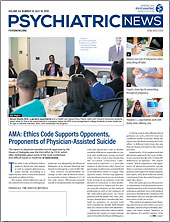physician, using his or her medical training and knowledge substantiated through scientific rationale, may decide to prescribe a medication for a disease or condition for which that medication has not been approved by the Food and Drug Administration (FDA). This practice, as you know, is referred to as off-label prescribing.
The FDA defines off-label drug use as “use of drugs for the indication, dosage form, regimen, patient, or other use constraint not mentioned in the approved labeling.” Further, the FDA states that when physicians prescribe a medication off-label, they have the responsibility to be “well informed” about the medication. When the FDA approves a medication, the agency has deemed that medication is safe and effective for its intended use. In the context of FDA approval, “safe” does not mean that the medication has no side effects. Rather, “safe” in this context means that the medication’s benefits outweigh its potential risks when using it for the approved purpose.
Prescribing medications off-label is common in psychiatry. In the APA Position Statement on Off-Label Treatments, adopted in July 2016, APA affirmed its support of off-label prescribing practices, stating, “The APA affirms strong support for the autonomous clinical decision-making authority of a physician and for a physician’s lawful use of an FDA-approved drug product or medical device for an off-label indication when such use is based upon sound scientific evidence in conjunction with sound medical judgment.”
Generally, reasons for off-label prescribing of a particular medication include the following:
•
An unapproved clinical indication for an FDA-approved drug.
•
Dosage outside of the range approved by the FDA.
•
Prescription of an FDA-approved drug to a patient who is not in the population approved by the FDA.
When a patient alleges that he or she was injured by off-label use of a medication, it must be established that the prescribing physician deviated from the standard of practice. Medical malpractice lawsuits alleging negligence in prescribing practices, including those involving drugs prescribed off label, typically include allegations against the physician for failure to
•
adequately assess the patient.
•
consult the patient’s prior medical records.
•
obtain informed consent from the patient.
•
prescribe a drug for the appropriate clinical indication, dosage, age, etc.
•
monitor for adverse events and therapeutic effectiveness.
Thus, when prescribing medications, either for off-label or approved uses, the medical record documentation should include the following:
•
A comprehensive clinical assessment of the patient.
•
Clinical rationale explaining why prescribing a particular medication off-label—be it for an unapproved indication, dose, population, etc.—is in the patient’s best interest.
•
Documentation of a thorough informed-consent process that includes discussion of risks, benefits, side effects, any associated black-box warnings, explanation of any off-label use, and alternatives to the prescribed medication with the patient.
•
Documentation of steps taken to monitor for adverse events and therapeutic effectiveness.
•
Proof of adherence to state prescription drug monitoring program requirements, when applicable.
When prescribing medications for approved or for off-label indications, documentation reflecting your clinical decision-making process is one of the most effective risk management tools. ■
This information is provided as a risk management resource for Allied World policyholders and should not be construed as legal or clinical advice. This material may not be reproduced or distributed without the express, written permission of Allied World Assurance Company Holdings, GmbH, a Fairfax company (“Allied World”). Risk management services are provided by or arranged through AWAC Services Company, a member company of Allied World.
The APA Position Statement on Off-Label Treatments is posted
here.

